
Electronic component provider Littelfuse (NASDAQ: LFUS) reported Q3 CY2024 results beating Wall Street’s revenue expectations, but sales fell 6.5% year on year to $567.4 million. On the other hand, next quarter’s revenue guidance of $525 million was less impressive, coming in 5.5% below analysts’ estimates. Its non-GAAP profit of $2.71 per share was also 30.2% above analysts’ consensus estimates.
Is now the time to buy Littelfuse? Find out by accessing our full research report, it’s free.
Littelfuse (LFUS) Q3 CY2024 Highlights:
- Revenue: $567.4 million vs analyst estimates of $557.7 million (1.7% beat)
- Adjusted EPS: $2.71 vs analyst estimates of $2.08 (30.2% beat)
- EBITDA: $123.3 million vs analyst estimates of $109.5 million (12.6% beat)
- Revenue Guidance for Q4 CY2024 is $525 million at the midpoint, below analyst estimates of $555.7 million
- Adjusted EPS guidance for Q4 CY2024 is $2 at the midpoint, below analyst estimates of $2.38
- Gross Margin (GAAP): 38.1%, in line with the same quarter last year
- Operating Margin: 15.5%, in line with the same quarter last year
- EBITDA Margin: 21.7%, in line with the same quarter last year
- Free Cash Flow Margin: 11.5%, down from 23% in the same quarter last year
- Market Capitalization: $6.31 billion
“In the third quarter, our global teams delivered strong execution and drove sales and earnings above our expectations,” said Dave Heinzmann, Littelfuse President and Chief Executive Officer.
Company Overview
The developer of the first blade-type automotive fuse, Littelfuse (NASDAQ: LFUS) provides electrical protection and control components for the automotive, industrial, electronics, and telecommunications industries.
Electronic Components
Like many equipment and component manufacturers, electronic components companies are buoyed by secular trends such as connectivity and industrial automation. More specific pockets of strong demand include data centers and telecommunications, which can benefit companies whose optical and transceiver offerings fit those markets. But like the broader industrials sector, these companies are also at the whim of economic cycles. Consumer spending, for example, can greatly impact these companies’ volumes.
Sales Growth
A company’s long-term performance is an indicator of its overall business quality. While any business can experience short-term success, top-performing ones enjoy sustained growth for multiple years. Unfortunately, Littelfuse’s 7% annualized revenue growth over the last five years was mediocre. This shows it couldn’t expand in any major way, a tough starting point for our analysis.
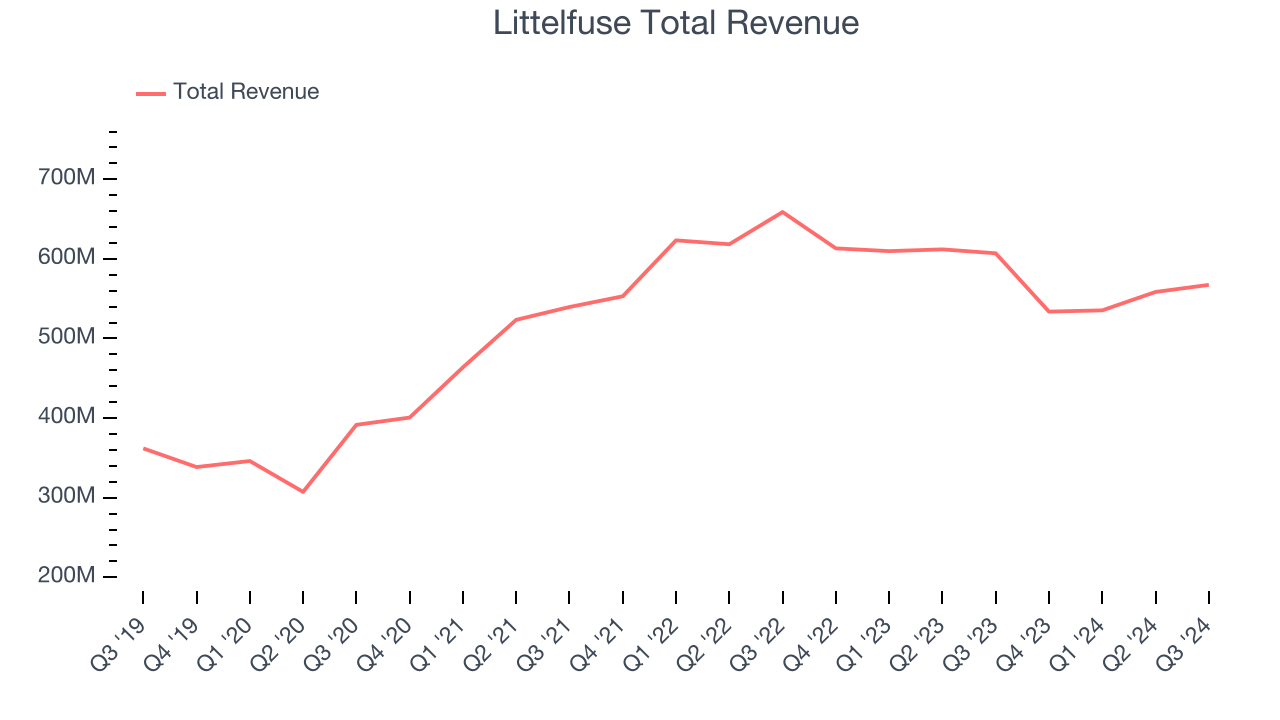
Long-term growth is the most important, but within industrials, a half-decade historical view may miss new industry trends or demand cycles. Littelfuse’s history shows it grew in the past but relinquished its gains over the last two years, as its revenue fell by 5.4% annually. Littelfuse isn’t alone in its struggles as the Electronic Components industry experienced a cyclical downturn, with many similar businesses seeing lower sales at this time. 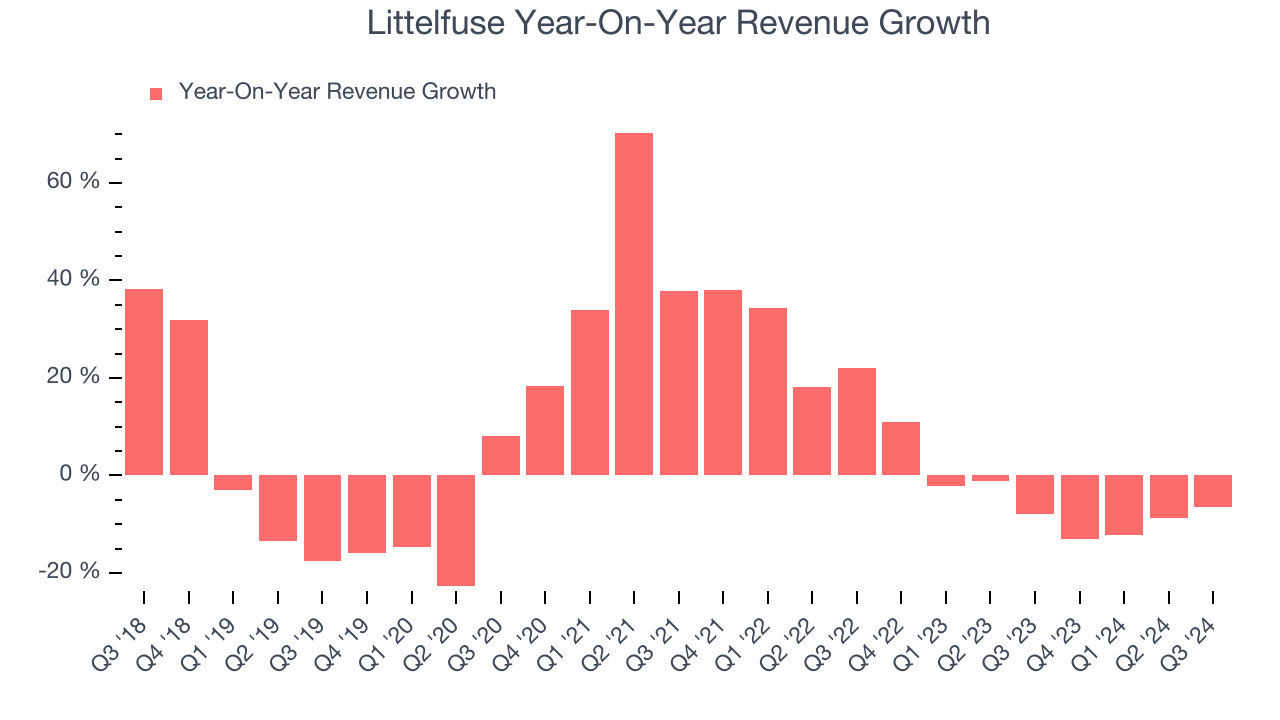
We can dig further into the company’s revenue dynamics by analyzing its most important segments, Electronics and Automotive, which are 53.6% and 30.2% of revenue. Over the last two years, Littelfuse’s Electronics revenue (fuses and switches) averaged 9% year-on-year declines while its Automotive revenue (trucks, commercial machinery, marine) was flat.
This quarter, Littelfuse’s revenue fell 6.5% year on year to $567.4 million but beat Wall Street’s estimates by 1.7%. Management is currently guiding for a 1.6% year-on-year decline next quarter.
Looking further ahead, sell-side analysts expect revenue to grow 5.4% over the next 12 months. Although this projection illustrates the market thinks its newer products and services will fuel better performance, it is still below average for the sector.
Here at StockStory, we certainly understand the potential of thematic investing. Diverse winners from Microsoft (MSFT) to Alphabet (GOOG), Coca-Cola (KO) to Monster Beverage (MNST) could all have been identified as promising growth stories with a megatrend driving the growth. So, in that spirit, we’ve identified a relatively under-the-radar profitable growth stock benefitting from the rise of AI, available to you FREE via this link.
Operating Margin
Littelfuse has been a well-oiled machine over the last five years. It demonstrated elite profitability for an industrials business, boasting an average operating margin of 15.9%. This result isn’t surprising as its high gross margin gives it a favorable starting point.
Looking at the trend in its profitability, Littelfuse’s annual operating margin rose by 3.1 percentage points over the last five years, showing its efficiency has improved.
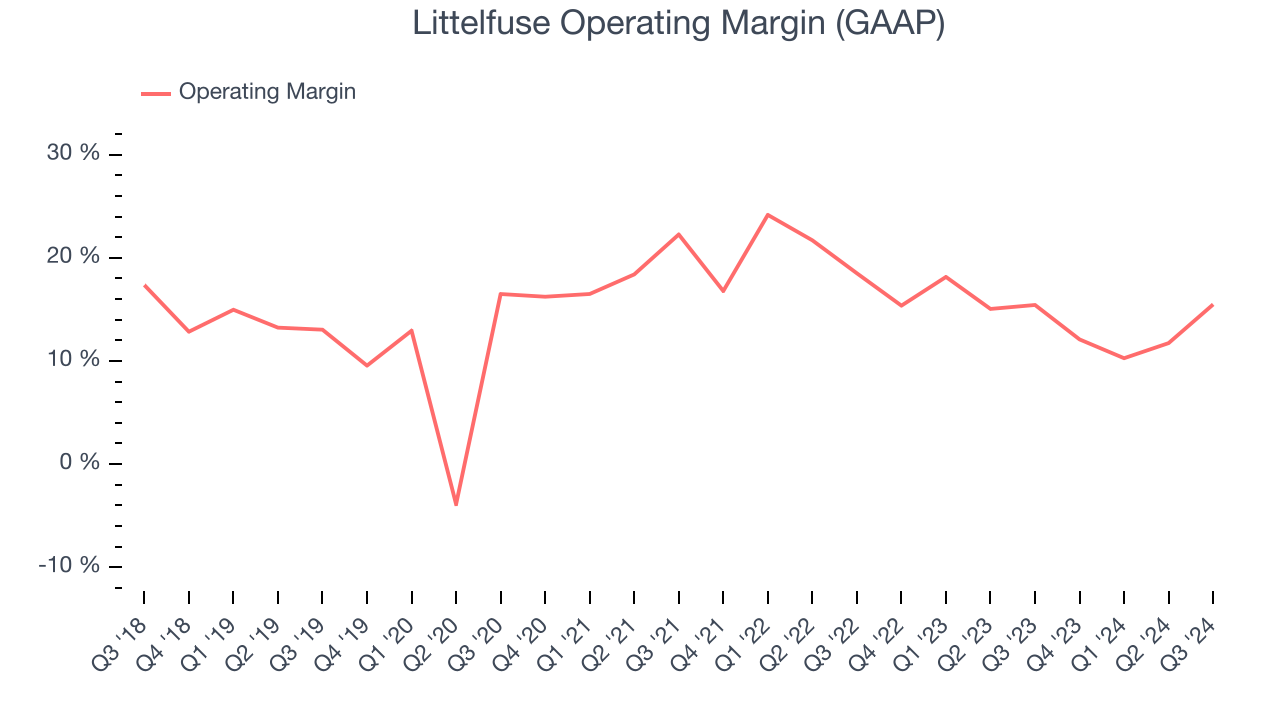
In Q3, Littelfuse generated an operating profit margin of 15.5%, in line with the same quarter last year. This indicates the company’s cost structure has recently been stable.
Earnings Per Share
Analyzing revenue trends tells us about a company’s historical growth, but the long-term change in its earnings per share (EPS) points to the profitability of that growth – for example, a company could inflate its sales through excessive spending on advertising and promotions.
Littelfuse’s EPS grew at a weak 2.4% compounded annual growth rate over the last five years, lower than its 7% annualized revenue growth. However, its operating margin actually expanded during this timeframe, telling us that non-fundamental factors affected its ultimate earnings.
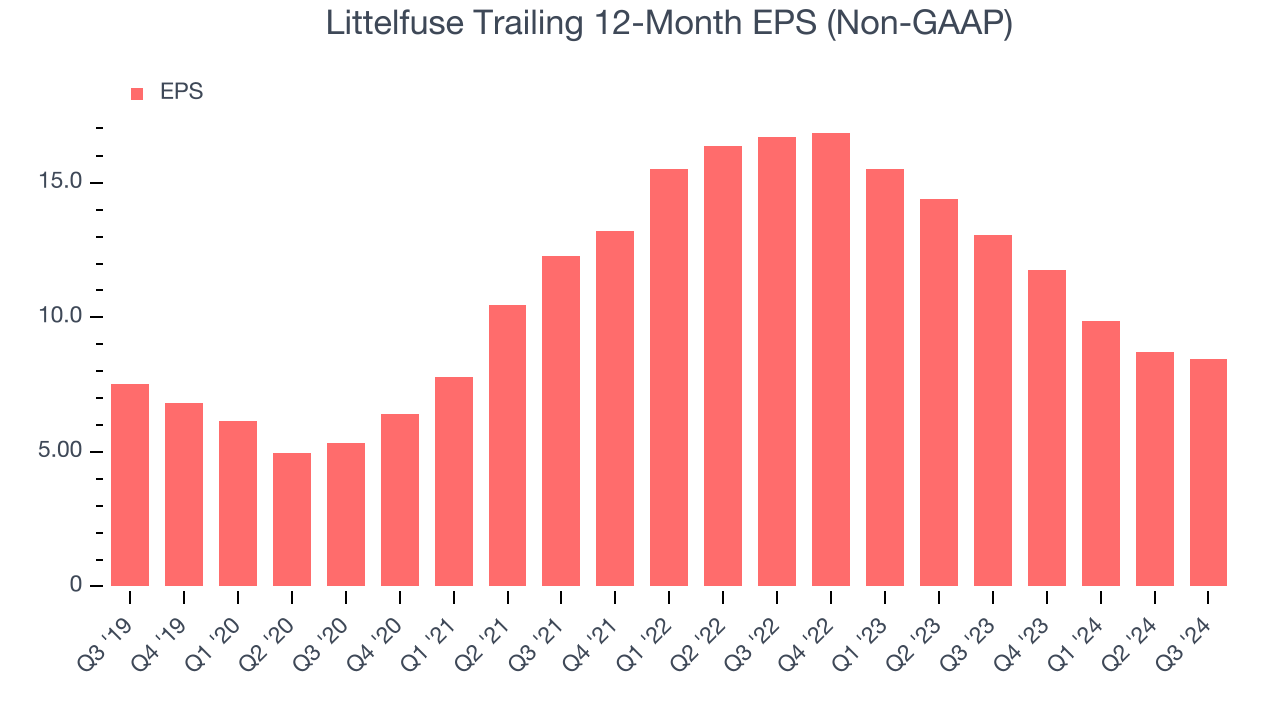
We can take a deeper look into Littelfuse’s earnings to better understand the drivers of its performance. A five-year view shows Littelfuse has diluted its shareholders, growing its share count by 1.4%. This dilution overshadowed its increased operating efficiency and has led to lower per share earnings. Taxes and interest expenses can also affect EPS but don’t tell us as much about a company’s fundamentals. 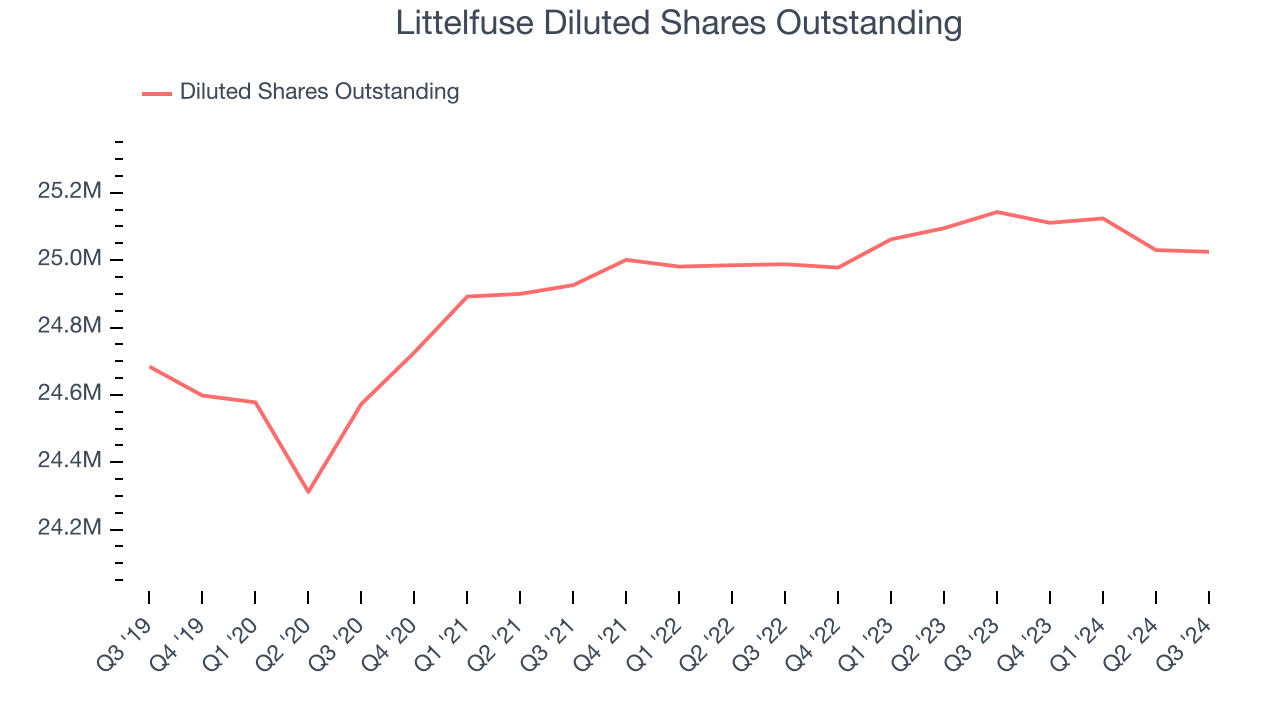
Like with revenue, we analyze EPS over a shorter period to see if we are missing a change in the business.
For Littelfuse, its two-year annual EPS declines of 28.8% show it’s continued to underperform. These results were bad no matter how you slice the data.In Q3, Littelfuse reported EPS at $2.71, down from $2.97 in the same quarter last year. Despite falling year on year, this print easily cleared analysts’ estimates. Over the next 12 months, Wall Street expects Littelfuse’s full-year EPS of $8.46 to grow by 25.4%.
Key Takeaways from Littelfuse’s Q3 Results
We liked how Littelfuse beat analysts’ revenue, EBITDA, and EPS expectations this quarter. On the other hand, its revenue and EPS guidance for next quarter both fell short of Wall Street’s estimates. Overall, this quarter was solid but the outlook was weak. The stock remained flat at $260.23 immediately after reporting.
Littelfuse put up rock-solid earnings, but one quarter doesn’t necessarily make the stock a buy. Let’s see if this is a good investment.The latest quarter does matter, but not nearly as much as longer-term fundamentals and valuation, when deciding if the stock is a buy. We cover that in our actionable full research report which you can read here, it’s free.





